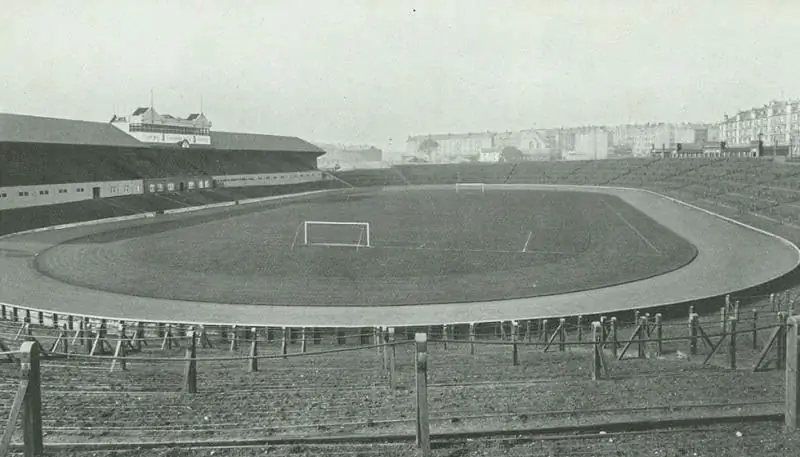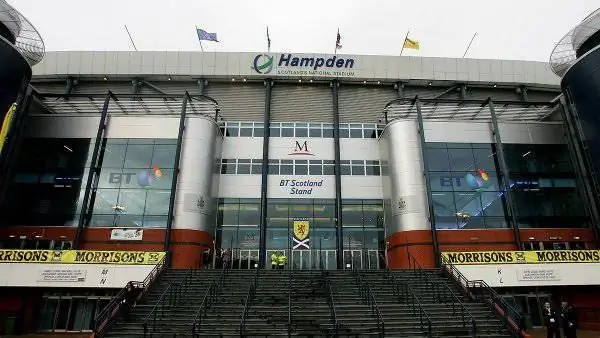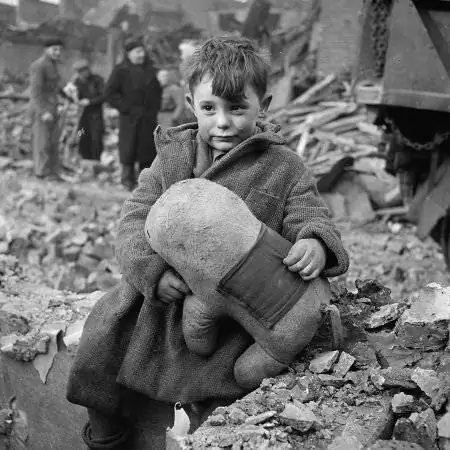- Author Matthew Elmers elmers@military-review.com.
- Public 2023-12-16 21:49.
- Last modified 2025-01-24 09:17.

In the summer of 1940, the government of fascist Germany, in order to ensure the rear for the upcoming war against the USSR, tried to make peace with Great Britain. But this operation was not successful. Then, on July 16, 1940, Hitler issued Directive No. 16 on the preparation of Operation Sea Lion, and on August 1, 1940, Directive No. 17 on conducting a broad air war against England. The purpose of the latter directive was the large-scale use of the three air fleets (3, 2 and 5) under the command of Colonel General Sperle, Colonel General Kesselring and Colonel General Stumpf to bomb England. The British government has taken all possible measures to ensure the security of the country. More than 100 radar stations were deployed on the coast, which could warn in advance of an air attack by German aircraft. However, the total number of combat aircraft and anti-aircraft guns did not allow Great Britain to ensure the complete security of the country. In April 1940, German troops landed in Norway and captured the country in a short time. Luftwaffe airfields were created on its territory, from which it was now possible to provide bombing of the northern regions of Great Britain.
The port city of Glasgow, located on the northwest coast of Great Britain, was the center of the shipbuilding and aviation industries. More than 20 shipyards have built and repaired ships for the British Navy and ships to supply the country with ammunition and products. The city was also famous for the fact that it was the football capital of Scotland. Back in 1887, the priest Brother Wolfrid created the first football team in this city. This team was named "Celtic", and the football club to which it belonged - "Brave Boys". The authority of the Celtic football team in Scotland was immense. So, for example, at the city stadium "Hempden Park" before the start of hostilities with Germany in the game with the team "Aberdeen" was attended by more than 140 thousand fans.

In the Glasgow area, in addition to factories that ensure the production of weapons, there were a lot of hospitals where wounded British soldiers were treated. The raids by the German aviation after the losses suffered by them in the fight against the fighters of the Royal Air Force and from the air defense systems, demanded a change in the tactics of bombing. Now German He-111 bombers carried out attacks on military and civilian targets at night and in thick fog. Radio navigation systems created in Germany allowed these bombers to accurately reach targets indicated in the flight mission in the absence of visibility. In 1940, during the raid of a large formation of He-111 bombers on Glasgow, an incident occurred that deserves the attention of a wide circle of readers of the Military Review. This case once again confirms that "there is also one warrior in the field." An article about this event was published in a Scottish newspaper in the 1950s. The journalist who published the article had to work hard to get the material into print (due to secrecy). But even with such nuances, the article aroused tremendous interest in the UK and for several days the inhabitants of the country discussed it for a long time. The article was called "Notes of the radio operator of the N-th battalion of the 22nd Guards Regiment Ernest Robert Hart." Below I will give the story of this radio operator.
“I am writing about events about which I cannot remain silent, I understand that my end may be near. There are no reinforcements, but the boshes continue to advance. My walkie-talkie has been broken a long time ago, so I have nothing else to do. So I decided, while I have free minutes, to write my own story about how I got to the front. If someone finds the material I have written, then let him draw the appropriate conclusion for himself and publish the article. I don't want anyone else to get hurt for the same reason as me. Africa today is far from the best place for aristocratic travel - it is a place of battles.
My name is Ernst Hart. I was born in London in 1908. After school, he graduated from a radio engineering college and, by a happy coincidence, got on the BBC radio station. In the first years of my work, I was an ordinary employee, and they only trusted me to work with electronics. After a while, the management drew attention to me. I got promoted to become sports editor. In addition to practicing technology, I was also fond of journalism. I especially liked to comment on football matches. Apparently, that's why they entrusted me with this section of work. After a while, Londoners began to recognize my voice on their receivers when I was broadcasting from football fields. I was especially proud of the privilege of commenting on the 1935 British Cup semi-final. Yes, yes, you heard my voice then! They began to consider me a valuable employee, and with the outbreak of the war with Germany, they gave me a reservation. When the bombing of London began, I was transferred to work in Glasgow. Upon arriving there, I had to comment on the radio on the Celtic-Glasgow Rangers match. For those who do not know, I would like to inform you that it was a charity match, all proceeds from which were to go to the Admiralty fund. Representatives of the highest command personnel of all branches of the armed forces were expected at the stadium that day, and the Prime Minister himself had to listen to the report about the match on the receiver. There were practically no vacancies at the stadium; there were many local wounded among the spectators. On this day, the strongest fog descended on Glasgow. He tightened the bowl of the stadium so that it was difficult to distinguish between the players. This can be compared to not seeing the mushrooms in a bowl of mushroom soup with a lot of cream. I wanted to cancel the broadcast: nothing could be seen from the commentary booth on the football field. But the phone did not work, and that it was impossible to broadcast, I could not report to the directorate of the BBC. And then a terrible story began in my life. An officer entered the commentator's booth, where I was preparing for the broadcast. He asked to postpone the broadcast for a while and go downstairs to a representative of the Royal Air Force Headquarters. I quickly went down to the stadium lobby, where an officer with the rank of captain was already waiting for me. He told me about something that all those present at the stadium could not even imagine. According to him, a large group of He-111 bombers was approaching Glasgow from Norway. According to intelligence reports, their task was to completely destroy the city, to which they were supposed to approach within half an hour. I felt sick because the bombing of London was fresh in my memory, when our house was destroyed before my eyes.

Our fighters in the fog will not be able to intercept the German bombers, and also the anti-aircraft artillery of the air defense will not be able to destroy them due to the lack of visibility. I advised the captain to urgently evacuate at least the fans from the stadium, to which the officer grinned and replied: “It's impossible! A crush will begin, and people will not have time to get out. To cancel such an important match for the country means to inflict great damage on our nation. We must play. The captain's last words reminded me of the expression of the poet Newbolt.
“Recently in Edinburgh,” the captain continued, “we destroyed a group of Nazi spies. Therefore, the enemy cannot have a source about fog over the city. Except, of course, unencrypted radio messages, that is, yours."
For some reason, the words of the captain did not flatter me. The captain further explained that there is a high probability of preventing the bombing if the commentator, that is, I, manages to convince the people of Great Britain, including the German pilots, that the weather is fine over Glasgow, there is not a single cloud, and the sun is shining brightly. Indeed, in such an environment, our fighters and anti-aircraft guns will be able to destroy German bombers. Therefore, I was advised to return to the cockpit, sit comfortably in a chair and start broadcasting the match, inventing various situations.
Back in the cockpit, with great difficulty I squeezed out the words on the air that the weather was fine over Glasgow. The referee announced the start of the match. Then I called the starting lineups of the teams, and then fell silent for a while. It turned out pretty stupid, but I really didn't know how and what to talk about next. Only after a few seconds I realized that the lives of thousands of people depend on the words I said, not only at the stadium, but throughout the city. Unwittingly, I saw a picture of a little Londoner in front of my eyes, who was sitting on the ruins of his house and hugging a plush hippo. I somehow didn’t manage to talk about anything, I didn’t understand the Scottish League yet, but knew only thoroughly the state of the English League teams. The match went on, and the only thing I could somehow orient myself on were the shouts of the fans, but they could not help me at the moment. Still, collecting my thoughts, I began reporting.
David Kinar intercepted the ball and is quickly approaching Celtic's goal from the left edge! Wonderful lumbago! But goalkeeper Willie Miller takes the ball. The goalkeeper throws in the ball, picks it up in the center of the field … I can hardly see from the announcer's booth who. But it seems to be Jimmy Delaney. We are delighted to see Delaney on the pitch today, I continued to tell the fans. He passes the ball to Lynch and Lynch passes the ball to the right. For Lynch, this is a farewell match tonight, because he, and also … um … Mophison and Devers will go to the army tomorrow. What a patriotic step on the part of the footballers. We will all be waiting for their return from Africa and hope that they will be all right. And here is George Paterson! Well … what are you waiting for? What is there? Yellow card? It seems not!
So I made it to the break of the first half. I was shaking as if in a fever. Suddenly, the same captain who had given me instructions 40 minutes ago came up to my commentary booth. He, smiling, informed me that, as reconnaissance reported, the German planes turned on the opposite course. The captain expressed his gratitude to me, and he himself, as he told me, was urgently sent to the headquarters. The officer then shook my hand and promised to contact me later. I remember that well. But neither in the evening, nor the next day, I received no news from the captain. The only thing that caught my eye was an article in the newspaper, which mentioned that the country's air defense provided protection of the city from German aviation during a football match. Among those awarded for this operation was the name of the captain who was awarded the medal. And I was glad to be alive, but my feelings were mixed.
I commented on the match to the end and, of course, composed everything for the UK fans, who listened to the report on the radio. After the match ended, I walked out of Hempden Park Stadium neither alive nor dead, and spent a couple of hours in a local pub sipping a beer. In the morning I received news from the editorial office. It turns out that no one warned them about anything, and I was fired for false reporting. The reservation was removed from me.
At the front I was identified by my education - a radio operator. Which, in principle, was not so bad. But who could have known that our detachment would have to get into such a mess. The commander was killed, and, saying goodbye to you, I am writing these sheets, which I will then put in the battery compartment of the radio, so that they do not scatter across this damned desert. Read them.

